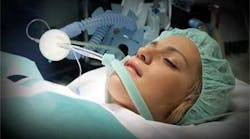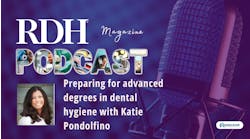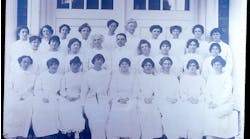An emerging role in hospital intensive care units
by Cindy Kleiman, CDA, RDH, BS, and Sandra Boody, CDA, RDH, MEd
Evidence-based research continues to reveal that oral health has a significant impact on general health. A good example is poor oral hygiene as a risk factor for a condition called ventilator-associated pneumonia (VAP).
VAP is a pneumonia associated with patients in critical care who are on mechanical ventilation. This patient population might include a near drowning victim, a car accident casualty, or a person who suffered a stroke. VAP accounts for 47% of all infections in ICU.1
Mortality rates for this condition are between 20% and 70%.1 VAP leads to increased hospitalization stays, costs, and mortality. In 76% of VAP cases, the bacteria colonizing the mouth and lungs are the same.1 The most prevalent bacteria are gram negative Pseudomonas aeruginosa and gram negative Staphylococcus aureus.3
Microaspiration of oropharyngeal secretions is a major risk factor for nosocomial (hospital acquired) pneumonia. The CDC reports that 63% of patients admitted to an ICU have oral colonization with a pathogen associated with VAP.1,2
Evidence-based research has shown that oral assessments and oral care play a vital role in reducing the rate of VAP.3,4 Specific oral care protocols to reduce the accumulation of plaque biofilm during hospitalization are currently under study. RDHs and RNs can collaborate to provide better patient care.
What would a dental hygienist do?
Oral care staff education, advising of assessment tools and in-service programs, and implementation of oral care protocols are just a few of the dental hygienist job duties. Clinical oral care without instrumentation may be performed every two to 12 hours, depending on the protocol.
The dental hygienist might also participate in routine meetings with the unit nursing staff to review patient outcomes.
Are there unique circumstances in the ICU for nurses that make providing oral care more difficult, and different from other hospitalized patients?
Yes, there are a multitude of issues. To start with, providing oral hygiene on a patient who is unconscious or semi-conscious and on a breathing machine is very difficult. Lack of patient cooperation, difficult access to the oral cavity, poor ergonomics, and loss of a gag reflex or swallow ability are the major factors.
Oral care is important, but it's not high tech. Many ICU nurses are recent grads who enjoy high-tech care. Critical care is filled with standardized protocols and high-tech computerized monitors.
Universal oral care standards do not exist. There are no buzzers that go off to alert the staff of impending breakdown of the oral mucosa. Reportedly, only half of the nation's hospital ICUs have any written protocol for oral care. For decades, oral care in hospitals consisted of using foam swabs or cotton tips with lemon glycerin. However, change is coming, and within the last few years the CDC has included a toothbrush in the oral care recommendations.
What types of skills are needed for working in critical care?
Excellent communication skills are a plus, as most of the work is provided in partnership with other professionals such as nurses and respiratory therapists. Compassionate communication with families is also needed, because patients are fighting for their lives. Patience is necessary. You might have a time scheduled to perform oral care; however, you might be kept waiting for an hour. Unexpected things happen in critical care. Do you have the patience and availability to wait for your turn? Patients in ICU do not go home at night, so nighttime oral care is essential. Do you like to work nights when the unit is quieter? Total patient care continues 24 hours a day in critical care. Would you enjoy spending time with the night shift?
Collaboration is a big plus. Are you a team player? Realize that these patients are very difficult to treat and all are at high risk. Nothing is simple, so working closely with an RN is essential.
You must be resourceful. Can you initiate, adapt, and problem solve? You are clearly not working in a familiar operatory. Do you have the passion and compassion to treat this special=needs population?
What type of clinical care would a dental hygienist do?
An RDH would not diagnose, probe, or scale. The terms used in nursing are oropharyngeal cleaning or oral cavity decontamination. This is done with oral hygiene products, not with instruments. Demonstrating a nursing oral assessment and oral hygiene techniques are important components in the clinical care process.
What are the legal implications of working on a nursing unit without dentist supervision?
Laws vary from state to state. It is imperative that RDHs review their state dental law. It is important that we work in partnership with RNs and, of course, with hospital approval.
RDHs are permitted to teach nurses the best way to perform an oral assessment, as it is not diagnosing. No probe or explorer is used. A mouth mirror may be the only instrument needed. In addition, the oral care is done with oral hygiene aids such as toothbrushes and suction swabs, not instruments.
What can I do to learn more?
A suggested starting point is to conduct a thorough literature search. Read all you can. It's easy to go online and research oral care and VAP. Network as much as possible, both with nurses and RDHs experienced in this field. Ask if you can observe on the unit. Act as a volunteer and participate in dental in-services.
Select continuing education courses that include working with special-needs populations, xerostomia, infection control, and oral pathology.
Oral care in the intensive care unit and cardiac critical care unit offers unique challenges and opportunities for the dental hygiene field. It's an exciting time, as oral health and systemic health receive much attention and research. In fact, the subject may hold a vital key to saving a patient's life.
This article is intended to raise interest in this subject and is not a comprehensive “how to” guide. For additional information, contact the authors: Cindy Kleiman, RDH, BS, at (480) 342-9655 or [email protected], or Sandra Boody, RDH, MEd, at (412) 576-7402 or [email protected].
References
- Cason C, Tyner T, Saunders S, Broome L. Nurses' Implementation of Guidelines for Ventilator Associated Pneumonia from the Centers for Disease Control and Prevention. Am J Crit Care. 2007; 16:28-37.
- Practice Alert. Oral Care in the Critically Ill. Am Assoc Crit Care Nurses. 8/2006.
- Munro C, Grap MJ. Oral Health and Care in the Intensive Care Unit: State of the Science. Am J Crit Care. 2004; 13:25-34.
- White R. Nurse Assessment of Oral Health: A Review of Practice and Education. Br J Nurs. 2000; 9:260-266.







